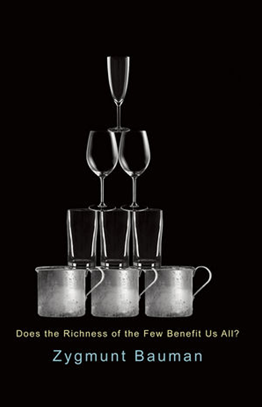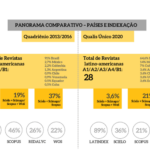
At the beginning of April, the UK newspaper The Guardian published an article in which the eminent sociologist Zygmunt Bauman¹, the introducer of the idea of “liquid modernity”, refuted accusations of plagiarism made against him using the argument that top-flight academics are not obliged to display “obedience” to “technical” rules on referencing.
His accuser, Peter Walsh, a PhD student at the University of Cambridge, points out that several passages found in Bauman’s latest book, Does the richness of the few benefit us all?², are exact or near-exact quotations taken from web sites in general and Wikipedia in particular. Even though Bauman gives a passing mention to these sources, he does not indicate that these passages consist of copied material by using italics, quotation marks or indented text, in accordance with university standards for plagiarism. Bauman even reproduces the errors found in the plagiarized sources.
The thing that is surprising in this matter is that Bauman, who has published more than 30 books during his 60 year career, chose to attack the rules and ideals which govern acknowledgment of authorship in the research process, rather than refute the accusation of plagiarism or provide any explanation for it. It is true that Bauman states that he has never once failed to acknowledge the authorship of the idea or concepts that he subsequently went on to develop or which inspired him. What is certain is that he also stated that the rules governing the citation of sources are mere technicalities which, at the end of the day, are not important. Polity, the publisher of his book, declined to comment on whether it had checked Bauman’s book for plagiarism.
We pick out two of the many comments and posts which have been published over the last few days. The first was made by Jonathan Bailey on the iThenticate Blog.
Bailey states that Bauman is incorrect when he thinks that making references to sources used is a mere “technicality”. This is not an issue of Bauman not following the exact citation style. Rather, it is that he cannot cite primary sources only while copying verbatim from secondary ones. Omitting attribution is not only a violation of a technical standard, it is breaking the chain of attribution, because science is a work in progress where every researcher is standing on the shoulders of those who came before. To quote Bailey (2014):
“This chain of attribution is crucial not just to maintain authorship and give credit for other’s work but to ensure that others reading it can verify the work is sound …. While the rules of citation may seem to be archaic, especially in the age of the Internet, the scientific community has to be cautious with changing those standards because they are so fundamental to how new knowledge is obtained”.
The second post which we would like to highlight and which is truly a pleasure to read was written by Alberto Bellan in the blog The IPKat. This blog, published since June 2003, is dedicated to the topics of copyright, patents, information technology, and issues of privacy and confidentiality from the British and European perspectives.
The post in IPKat with the ironic title Zygmunt Bauman — liquid copyright or solid plagiarism? presents a series of facsimiles side by side clearly showing the sources of the copied parts of Bauman’s book. It then refers to the guides produced by Harvard University and the University of Leeds where Bauman is a professor, which state that the copying of pieces from various sources, where some words are changed here and there, or with appropriate paraphrasing, is considered “mosaic plagiarism”. This is exactly the transgression that Bauman commits multiple times in his book.
It is not pedantry (as Bauman called it) to require authors to indicate when they are using the words of other authors. Attribution must always be given to the copied author, even if the source is Wikipedia since this source requires formal citing according to its Creative Common³.
It is very interesting that in this post-modern society, where it would appear that fixed hierarchies, old orders and the classic rules of the academic world of solidly modernity are beginning to melt away all around us through the liquid expansion of copyright as understood by Zygmunt Bauman.
This post is open to opinions. We invite readers to give us their comments.
Notes
¹Zygmunt Bauman is a Polish sociologist, philosopher and essayist born in 1925, known for coining the term and developing the concepts of “solid modernity – liquid modernity” and the construction of personal identity.
Although Bauman is considered a post-modern thinker, the term “post-modern” does not apply to him since he uses the concepts of solid and liquid modernity to characterize what he considers two sides of the same coin.
Bauman argues that in liquid modernity identities are similar to a volcanic crust that hardens, then melts again and constantly changes shape. Liquid modernity refers to the process through which the individual must pass in order become part of an increasingly global society, without a fixed identity yet which is maleable and changeable. Identity has to be invented, created and masks for survival have to be molded.
If previously, in the XVIII century, society was characterized by a clear sense of the individual belonging to the different social strata, today, with the rise of social networks and ICT’s, global identities, fickle, permeable and fragile in themselves, fluctuate according to the trends that defines consumerism.
http://es.wikipedia.org/wiki/Zygmunt_Bauman
² Bauman, Z. Does the Richness of the Few Benefit Us All? Zygmunt Bauman. Polity. 2013. 100 p. Available from: http://www.wiley.com/WileyCDA/WileyTitle/productCd-074567108X.html
³ Wikipedia:Texto de la Licencia Creative Commons Atribución-CompartirIgual 3.0 Unported http://es.wikipedia.org/wiki/Wikipedia:Texto_de_la_Licencia_Creative_Commons_Atribuci%C3%B3n-CompartirIgual_3.0_Unported
References
JUMP, P. Zygmunt Bauman rebuffs plagiarism accusation. The Guardian. 3 April 2013. Available from: http://www.timeshighereducation.co.uk/news/zygmunt-bauman-rebuffs-plagiarism-accusation/2012405.article?utm_campaign=blog-alerts&utm_source=hs_email&utm_medium=email&utm_content=12444770&_hsenc=p2ANqtz–eLVRTV-oi2lSrXnd6Hp6uosuEiAgenw72Pi8_prhaWa_ 8Z52ZTVExxCxmPS3pyo5sCzg1Lggu2rj84WnpzLSr5T8vbA&_hsmi=12444770
BAILEY, J. Why citation is more than a technicality. iThenticate. 8 April 2014. Available from: http://www.ithenticate.com/plagiarism-detection-blog/why-citation-is-more-than-a-technicality?utm_campaign=blog-alerts&utm_source=hs_email&utm_medium=email&utm_content=12444770&_hsenc=p2ANqtz–DNXc9R_g0ltfixryLZO1DdsaKTlXQhoWOIxk5pNxxgNbGh5F6xxW6LiIS35PpNQNac-NoQw_xMQ9nEn2HyMRM2C8Lcw&_hsmi=12444770#.U0_M_GwU-00b
Zygmunt Bauman — liquid copyright or solid plagiarism? The IPKat. 11 April 2014. Available from: http://ipkitten.blogspot.com/2014/04/zygmunt-bauman-liquid-copyright-or.html
 About Ernesto Spinak
About Ernesto Spinak
Collaborator on the SciELO program, a Systems Engineer with a Bachelor’s degree in Library Science, and a Diploma of Advanced Studies from the Universitat Oberta de Catalunya (Barcelona, Spain) and a Master’s in “Sociedad de la Información” (Information Society) from the same university. Currently has a consulting company that provides services in information projects to 14 government institutions and universities in Uruguay.
Translated from the original in Spanish by Nicholas Cop Consulting.
[Reviewed – 08 May 2014]
Como citar este post [ISO 690/2010]:

















Read comment in Spanish, by Gustavo Andrade: http://blog.scielo.org/es/2014/04/28/etica-editorial-los-intelectuales-tambien-tienen-que-hacer-referencias-bibliograficas/#comment-1042
Read comment in Portuguese, by denise bottmann: http://blog.scielo.org/blog/2014/04/28/etica-editorial-os-intelectuais-tambem-tem-que-fazer-referencias-bibliograficas/#comment-865
Dear Ernesto,
thank you for your lovely post and for the kind words on our note on the IPKat.
Would you be so kind to tell us where one can find the Guardian article you mention?
Best wishes,
Alberto
PS: Talking about attribution, the note was penned by me, not by David Brophy and Catherine Lee. I’d wish to write like them, but I am not sure whether this works vice-versa.
The reference to The Guardian, is the first in the list of this post
Sorry for my confusion of authorship of the note, now I see that the author is you, Alberto Bellan, and for my mistake I assigned to David and Catherine.
I have asked the editor to correct the error in the three languages.
Ernesto
Read comment in Spanish, by David Franco C.: http://blog.scielo.org/es/2014/04/28/etica-editorial-los-intelectuales-tambien-tienen-que-hacer-referencias-bibliograficas/#comment-1084
Read comment in Portuguese, by Joyce Silva: http://blog.scielo.org/blog/2014/04/28/etica-editorial-os-intelectuais-tambem-tem-que-fazer-referencias-bibliograficas/#comment-1021
Read comment in Spanish, by Maria Espina: http://blog.scielo.org/es/2014/04/28/etica-editorial-los-intelectuales-tambien-tienen-que-hacer-referencias-bibliograficas/#comment-10589
Read comment in Spanish, by Max: http://blog.scielo.org/es/2014/04/28/etica-editorial-los-intelectuales-tambien-tienen-que-hacer-referencias-bibliograficas/#comment-33678
Read comment in English, by Phil Badiz: http://blog.scielo.org/blog/2014/04/28/etica-editorial-os-intelectuais-tambem-tem-que-fazer-referencias-bibliograficas/#comment-19784